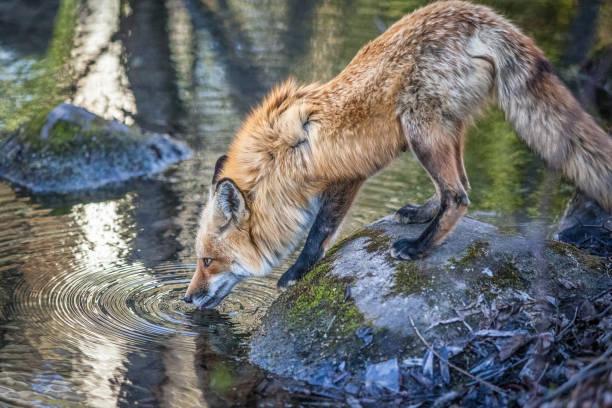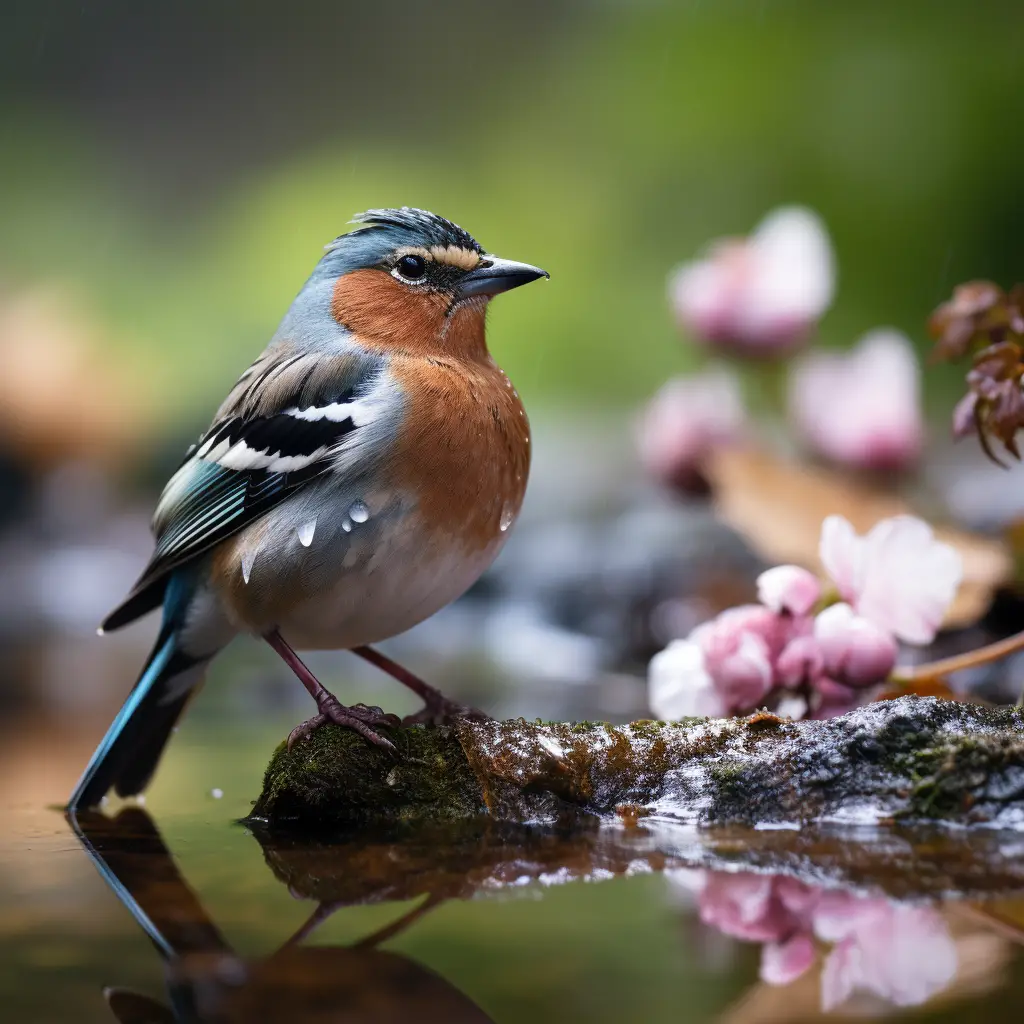
Foxes are beautiful animals, but when they appear in your backyard, you may worry about their impact on your pond’s fish population. Do foxes take fish from backyard ponds? Let’s dig into the answer and explore what you can do to protect your beloved pond inhabitants.
Do Foxes Take Fish From Backyard Ponds?
The short answer is that yes, some foxes will eat fish from backyard ponds. To understand why this happens and what can be done about it, let’s look at some of the behaviors behind this behavior.
Foxes may not be the first animal to come to mind when considering backyard pond predators, but they can be a problem. Foxes are known to take fish from ponds and may do so more often during breeding season or if food is scarce in their natural habitats.
The best way to protect fish in backyard ponds from foxes is to ensure no food sources around the pond. This means removing open garbage bins, pet food bowls, or bird feeders and keeping the area clear of fallen fruit. Additionally, fencing off the pond’s perimeter can help protect against foxes looking to take advantage of an easy meal.
How to Protect Your Fish from Foxes?

Foxes are a common sight in urban and rural environments. While foxes may look cute, they can be quite a nuisance if you have a backyard pond or fish tank. Fortunately, you can take steps to protect your fish from these predators. Let’s break down how to keep your fish safe from foxes.
Secure Your Pond or Tank
The first step to protecting your fish from foxes is to secure the area around the pond or tank. Make sure the area is fenced and that the fence is at least six feet high. You should also ensure that any gaps between the fence and the ground are blocked off so that foxes can’t get in.
Motion Sensor
If possible, install motion-sensor lights around the perimeter of the pond or tank so that any approaching foxes will be scared away by the light.
Provide Hiding Places for Your Fish
Providing hiding places for your fish is essential if you have a pond. Floating plants such as water hyacinths are great for this purpose as they provide shelter for your fish while also blocking out some of the sunlight that can cause algae blooms in ponds.
For tanks, make sure to include rocks and other hiding spots so that your fish have somewhere they can go if they feel threatened by an approaching predator such as a fox.
Remove Any Attractants
Foxes are attracted to food sources, so remove any attractants, such as pet food dishes or bird feeders, from near your pond or tank. If you want to feed wildlife in your garden, ensure it’s far away from any water where foxes might lurk looking for an easy meal! Additionally, keep garbage cans securely closed and store pet food indoors when not in use.
Assemble a Fox Deterrent Team Another way to protect your fish from foxes is to assemble a “fox deterrent team” consisting of humans and animals who can scare away potential predators before they get too close.
Dogs

Dogs make excellent additions to this team since their barking will usually scare away approaching foxes before they even reach your pond or tank. Additionally, humans armed with flashlights and noisemakers (such as air horns) can help ward off any particularly bold foxes that manage to get close enough despite all of your other precautions!
Fox attacks on ponds and tanks are not uncommon. Still, fortunately, there are steps you can take—from securing fences around the area to assembling a deterrent team—to protect your valuable aquatic friends from these predators. By following these tips, you should be able to keep your fish safe while still enjoying all the benefits of having them in your backyard!
Traps
In extreme cases, you may need to use traps to catch and remove foxes from your property. Be sure to contact your local wildlife authorities before attempting this, as trapping or killing foxes is illegal in many areas.
Ultimately, the best way to protect your fish from foxes is through prevention. Follow the steps outlined above, and you’ll be able to enjoy your pond or tank without worrying about foxes getting to your fish. Good luck!
The problem of foxes taking fish from backyard ponds
The problem of foxes taking fish from backyard ponds is a common issue for many homeowners with a pond in their backyard. Foxes are opportunistic predators that will take advantage of any easy food source, and backyard ponds can provide a convenient protein source. Foxes can cause significant damage to backyard ponds by eating large numbers of fish and disrupting the ecosystem. This affects the fish population and the other aquatic life that depend on them.
One of the reasons why foxes are attracted to backyard ponds is that they provide an easy source of food. Fish are one of the foxes’ preferred prey, and they will take advantage of any opportunity to catch them. Foxes are also very adaptable animals that can survive in various habitats, including urban and suburban areas. This means that your backyard pond could still be at risk even if you live in a populated area.
Another reason why foxes are drawn to backyard ponds is because they provide cover and concealment. Foxes are shy animals that prefer to hunt and forage under cover of darkness or in areas with dense vegetation. Backyard ponds often have tall grass, bushes, or other vegetation growing around them, providing the perfect cover for foxes to sneak up on unsuspecting fish.
Foxes can cause significant damage to backyard ponds by eating large numbers of fish and disrupting the ecosystem. The loss of fish can have a cascading effect on the rest of the aquatic ecosystem, as other aquatic life, such as amphibians, insects, and crustaceans, depend on them. Additionally, foxes may damage the pond by digging around the edges or clawing at the sides of the pond.
To protect your backyard pond and the fish population, it’s essential to take steps to deter foxes from approaching the water. This can include installing a fence around the pond’s perimeter, using a barrier such as chicken wire, or installing a wire mesh or netting over the water’s surface.
Additionally, you can reduce the amount of cover and food sources around the pond by removing tall grass, bushes, and other vegetation. Using natural or commercial repellents and monitoring the area for signs of foxes can also help to deter them.
Reasons Why Foxes Are Attracted To Backyard Ponds
Foxes are attracted to backyard ponds for several reasons, but the main one is the easy access to food. Fish are one of the foxes’ preferred prey, and they will take advantage of any opportunity to catch them. Foxes are opportunistic predators that will eat whatever is available to them, and backyard ponds provide a convenient source of protein for them. This means that even if you have a small pond in your backyard, it could still be at risk of fox predation.
Another reason why foxes are drawn to backyard ponds is because they provide cover and concealment. Foxes are shy animals that prefer to hunt and forage under cover of darkness or in areas with dense vegetation.
Backyard ponds often have tall grass, bushes, or other vegetation growing around them, providing the perfect cover for foxes to sneak up on unsuspecting fish. This means that even if you have a pond in a well-lit area, foxes may still be able to approach it unseen.
Foxes are known to target a wide range of fish species, but they are particularly attracted to small, slow-moving fish. This can include species such as goldfish, koi, and minnows.
These types of fish are easy for foxes to catch and are also a good source of nutrition for them. Foxes are also known to target larger fish such as catfish, bass, and pike, but this is less common.
It’s worth noting that foxes are not picky eaters and will eat almost anything that is available to them. This means that if a fox has access to a backyard pond, it will eat whatever fish are in it, regardless of species or size. This is why it’s important to take steps to deter foxes from approaching backyard ponds and to protect your fish population.
The damage That Foxes Can Cause To Backyard Ponds
Foxes can cause significant damage to backyard ponds and fish populations. The most obvious damage is the loss of fish, as foxes can eat large numbers of them in a short period. This can have a cascading effect on the rest of the aquatic ecosystem, as other aquatic life, such as amphibians, insects, and crustaceans, depend on fish for food and survival. Foxes will also eat fish eggs, making it difficult for fish populations to recover.
Another way foxes can cause damage to backyard ponds is by disrupting the ecosystem. Foxes are not native to many areas and their presence can disrupt the natural balance of the pond ecosystem. Foxes can also introduce diseases and parasites to backyard ponds, which can harm the fish population and other aquatic life. Foxes can also damage the pond itself by digging around the edges or clawing at the sides of the pond.
Foxes can also create a nuisance by leaving droppings and urine around the pond, which can be unsanitary and unpleasant. This can also lead to unpleasant odors that can be difficult to remove. Foxes are also known to carry fleas and other parasites that can be transmitted to pets and humans, so it’s important to take precautions when dealing with foxes.
Finally, foxes can damage the aesthetic of backyard ponds and gardens. Foxes can dig holes around the pond and uproot plants, which can be unsightly and difficult to repair. They can also damage the landscaping around the pond, which can be costly to replace. Foxes can also be a nuisance to neighbors and can create a sense of insecurity in the neighborhood.
Conclusion
By taking the necessary precautions, such as securing fences around ponds and tanks, providing hiding places for fish, removing any attractants near your pond or tank, and assembling a fox deterrent team consisting of humans and animals who can scare away potential predators before they get too close, you can help protect your valuable aquatic friends from foxes. With these steps in place, you should be able to keep your fish safe while still enjoying all the benefits of having them in your backyard!





